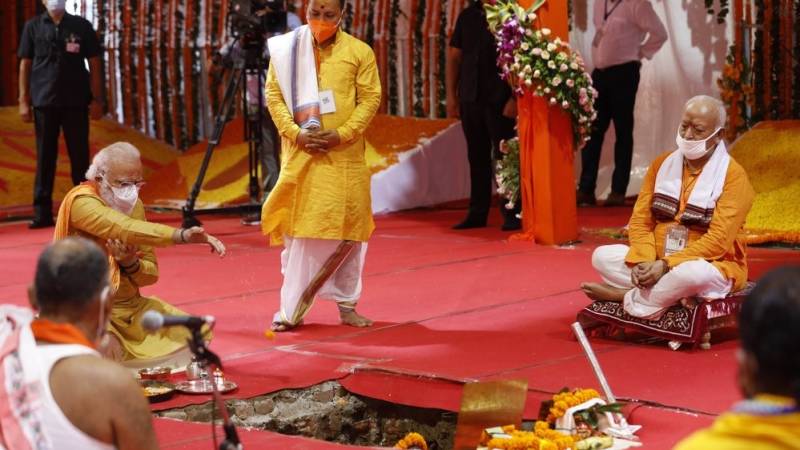Modi lays foundation of Ram temple at razed Babri mosque site

Stay tuned with 24 News HD Android App

Indian Prime Minister Narendra Modi unveiled a plaque Wednesday to kick off the construction of a Hindu temple in the northern city of Ayodhya on a spot where a mosque was demolished nearly 30 years ago, prompting deadly riots nationwide.
Modi offered prayers to nine stone blocks with Lord Ram inscribed on it amid chanting of Hindu religious hymns to symbolise the start of construction of the temple, which is expected to take three and a half years to complete.
"I am grateful to witness history being made. Crores (millions) of Indians cannot believe that this day has come. The entire country is in the spell of Lord Ram ... Ram is an emblem of India's unity in diversity," Modi said in a speech.
The Hindu nationalist leader wore a traditional outfit of a gold Kurta, a long shirt, and white Dhoti, a loose cloth wrapped around his waist, along with his face mask.
A masked Modi, 69, shared the stage with the head of the RSS, the militaristic Hindu supremacist group that is parent to the Bharatiya Janata Party (BJP) and which Modi joined as a young man.
"It's an emotional and historic moment. Wait has been worthwhile," said Lal Krishna Advani, a 92-year-old leader of the governing BJP who was in the forefront of the party's temple campaign in the 1990s.
Organisers said the ceremony was set on an astrologically auspicious date for Hindus but Wednesday also marked a year since the Modi government revoked the semi-autonomous status of Indian-administered Kashmir - the country's only Muslim-majority region.
The symbolism was impossible to miss since the BJP had long pledged in its manifesto to strip the disputed region of Kashmir of its autonomy and to build a temple to the Hindu God Ram where the Mughal-era mosque once stood.
The main roads were barricaded and about 3,000 paramilitary soldiers were guarding Ayodhya city, where all shops and businesses are closed. Last week, a priest and 15 police officers at the temple site tested positive for the coronavirus, which has infected 1.9 million people in India and killed nearly 40,000.
"Had this function been held on normal days all these roads would have been chock-a-block with people. Millions of people would have come to Ayodhya to witness this historic event," temple priest Hari Mohan said.
Only 175 religious saints, priests and Hindu and Muslim community representatives were invited to the ceremony. Water from Indian rivers in 2,000 earthen pots sent by various Hindu temples and Sikh shrines were poured at the site.
The groundbreaking follows a ruling by India's Supreme Court last November favouring the building of a Hindu temple on the disputed site in Uttar Pradesh state. Many Hindus believe their God Ram was born at the site and claim Muslim Emperor Babur built a mosque on top of a temple there.
The Babri mosque was destroyed by Hindu mobs with pickaxes and crowbars in December 1992, sparking big Hindu-Muslim violence that left some 2,000 people, mostly Muslims, dead. The Supreme Court's verdict allowed a temple to be built in place of the demolished mosque.
Those invited to the groundbreaking ceremony include Iqbal Ansari, the main Muslim litigant in the Supreme Court case, who now supports building the temple in Ayodhya.
The court also ordered that Muslims be given two hectares (five acres) of land to build a new mosque at a nearby site. The temple will be about 72 metres (235 feet) wide, 91.5 metres (300 feet) long and 49 metres (161 feet) high with five domes with a total area of about 7,804 square metres (84,000 square feet). The complex will also have a prayer hall, lecture hall, visitors' hostel and museum.
Houses and other buildings close to the temple site in the city of Ayodhya have been painted yellow to recreate the look when the Hindu God Ram ruled there for thousands of years, according to the Hindu epic Ramayana.
"Yellow is an auspicious colour. As per Hindu tradition, yellow symbolises purity and light," temple priest Mahant Kamal Narain Das said.
Muslims comprise about 14 percent of Hindu-majority India's 1.3 billion people. The temple-mosque dispute badly divided Hindus and Muslims, often triggering communal clashes.
Prominent Muslims have said the community was resigned to the new reality but fear the new temple could embolden Hindu nationalists to target two other mosques in Uttar Pradesh.
"The Modi government should assure Muslims that Hindu outfits will not ask for the construction of temples in Varanasi and Mathura after demolishing existing mosques there," said Ansari, the main litigant in the Babri mosque case.
The Gyanvapi mosque in the city of Varanasi is in a temple complex dedicated to Lord Shiva. In the city of Mathura, the Shahi Idgah mosque stands adjacent to the temple complex that marks the birthplace of the Hindu God Krishna. Hindu organisations say both were built over razed temples.
